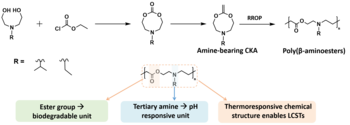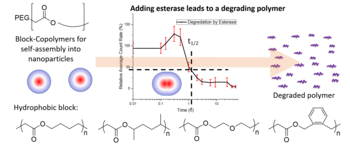Radical Ring Opening Polymerisation
Synthesis and polymerisation of several CKAs for the formation of functional and fully biodegradable polyesters
Radical ring-opening polymerisation (RROP) of cyclic ketene acetals (CKAs) is a radical polymerisation which leads to polyesters and hence to biodegradable polymers. All functional units of the monomers, the CKAs, are translated into the polymer through the polymerisation. As a consequence, a broad range of semi-crystalline, water soluble, water insoluble and also pH responsive polyesters are available through RROP. Characterising and controlling the side reactions in RROP is one of the main challanges in this polymerisation. One side reaction is that the ring might not open up, other side reactions include the branching reactions typical for all radical polymerisations, leading to a polymer with a mixture of short- and long chain branching. All of the above, the functionality of the monomer, degree of ring-opening and the degree of branching are levers to fine-tune the macroscopic properties of the final polyesters. Once produced, the polyesters from RROP of CKAs are biodegradable through esterase. They are hence a highly promising class of polymers for a sustainable future.
Responsible Scientists at RP
Selected Publications:
1) ACS Appl. Mat. 2022, 4, 7981-7902. DOI: 10.1021/acsapm.2c01483
2) Eur. Polym. J. 2020, 134, 109851. DOI: 10.1016/j.eurpolymj.2020.109851
3) Polym. Chem. 2019, 10, 5285-5288. DOI: 10.1039/C9PY01103J




